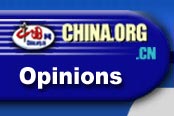|
The Taiwan question is always at the core of the strategic relationship between China and the United States.
The US Government's stance on Taiwan shows the changes it has made in its China policy, which has significantly influenced Sino-US relations in the past decades and may continue to well into the future.
Due to the international strategic situation and US' prime interests at that time, the United States chose the mainland between the Chinese mainland and Taiwan in the 1970s.
In the 1972 Shanghai Communique, the United States acknowledged: "All Chinese on either side of the Taiwan Straits maintained that there is but one China and that Taiwan is part of China."
This position was fully re-emphasized when the US renounced its so-called diplomatic relationship with Taiwan and established diplomatic relations with the People's Republic of China in 1979.
However, the United States sticks to the one-China principle mainly in its words, but encourages and helps to create "two Chinas" or "one China, one Taiwan" with its deeds.
The United States sold F-16 fighters to Taiwan in 1992, made an adjustment to its Taiwan policy in 1994, allowing Lee Teng-hui's visit to the United States in 1995, and sent warships to the Taiwan Straits in the spring of 1996.
In past years, the United States has significantly increased its arms sales to Taiwan both in quantity and quality, far exceeding the scope stipulated in the Shanghai Communique.
On Taiwan's entrance into or "return" to international organizations that are only for sovereign states, the US attitude is becoming more ambiguous and even swerving.
On Taiwan's entry or "return" to the United Nations, whose membership is confined to sovereign states, the United States only expresses not to support or not to do so at the moment.
The US Congress has passed resolutions in support of Taiwan's attempts to get a berth in the International Monetary Fund.
Considering the stability of Sino-US relations, the US Government sometimes indicates its willingness to adhere to the one-China policy to patch up bilateral relations.
When US President Bill Clinton visited Shanghai in June 1998, he repeated the position by saying: "I had a chance to reiterate our Taiwan policy which is that we do not support independence for Taiwan, or two Chinas, or one China, one Taiwan, and we do not believe that Taiwan should become a member of any organization for which statehood is a requirement."
The reason the Taiwan question has plagued the history of Sino-US relations for so long is due to the US strategy towards China, including its global and Asian strategy which determines its strategy towards China.
The US policy towards Taiwan and the Chinese mainland in the 1950s and 1960s was to recognize Taiwan instead of the Chinese mainland.
It was because the United States advocated "containing China" at the time. The strategy served its global and Asian strategy of containing the ''expansion of communism.''
In the 1970s and 1980s, the US' sudden recognition of the People's Republic of China was part of its global strategy to "containing the Soviet Union from expansion and threat."
After the Cold War, the gravity of the Taiwan question surpassed that of the 1970s and 1980s.
It is because of the shifts in US strategy towards China from "allying China against the Soviets" to accelerating changes by imposing pressure at the beginning of the Cold War and the double-track strategy of "engagement and vigilance" afterwards.
At that time, it was no longer necessary for the United States to contain and confront the Soviets in Asia and the rest of the world.
Instead, to ensure its superiority in the world and best promote the expansion of its own values on democracy, human rights and a market economy, the United States prevented the new powers from rising up to its challenge.
The current and future trend of US policy towards Taiwan continues to depend on the adjustments of its Chinese mainland policy.
If the US does not adopt the negative strategy to contain and heighten vigilance against Chinese mainland's growth, the development of its Taiwan policy and US-Taiwan relations will be limited to a certain degree, and the United States will not use
Taiwan as a card to contain and guard against Chinese mainland.
If US strategy towards the Chinese mainland gives priority to containment and vigilance, the US will definitely make Taiwan "an unsinkable carrier" to counterbalance Chinese mainland.
The current problem is that, due to the fact that the United States cannot make it clear whether the People's Republic of China is a strategic partner or a strategic opponent of the United States in the future, US strategy toward Chinese mainland is a combination of containment and vigilance.
This is the fundamental reason behind the repetitive and vacillating US policy on the Taiwan question after the Cold War.
Because the characteristics of Sino-US relations are difficult to fix in a short period, the swinging situation of the US double-faced policy towards Taiwan will continue.
The Taiwan question will continue to impact Sino-US relations and possibly even arouse a diplomatic crisis.
(By Chu Shulong, a researcher with the China Institute of Contemporary International Relations.)
(China Daily 08/29/2000)
| 